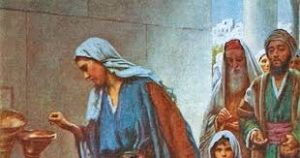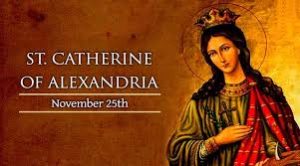HOMILY WEEK 34 01 – Year I
Giving God Glory and Praise at all Times:
Optional Memorial of St Catherine of Alexandria
(Dan 1:1-20; Dn 3:52-56; Lk 21:1-4)
****************************************
When Bad Things Happen to Good People is a book written by Rabbi Kuschner, appropriate for the readings today inviting us to trust God totally in good times and bad.
The psalm response from the Book of Daniel puts it succinctly: Glorify and praise God at all times.
Certainly, King Jehoiakim in the first reading from Daniel would have appreciated such a book. His situation addresses the mystery of evil in our lives, and the question of who God is in the face of tragedy. We read in this passage that “The Lord let King Jehoiakim fall into the power” of the king of Babylon. Without passing moral judgment on the king, certainly the Jewish people must have asked themselves why they were suffering so much in spite of their faith in God.
Part of the answer to this mystery of suffering begins to emerge almost immediately in the persons of Daniel and his companions. The answer is that God does not prevent suffering, but always draws good out of evil, whatever that evil might be.
In this case, the faith of Daniel and his companions leads them to request a special diet to remain faithful to their beliefs, and miraculously, they defy all expectations, thrive and become the kings favored consultants. God was already drawing good out of the tragedy of defeat, oppression and exile.
The psalm response from the Book of Daniel reminds us that our faith response to seeming tragedy in our lives is to glorify and praise God at all times. Corrie ten Boom and her sister in a concentration camp during the war are examples of faith at work in times of suffering and deprivation. Huddled with other captives in deplorable conditions, they did not question God but kept on believing, praying even for their captors, sharing their faith with others, leading bible study and glorifying and praising God always. Eventually, they realized that they could even be grateful for the fleas that were tormenting them, because those fleas kept the guards from inspecting them too closely and preventing them from gathering to pray, which is what sustained them in this darkness.
 In the gospel, Jesus observes the rich people putting money into the temple treasury, but takes special notice of the poor widow whose faith empowered her to give, not from her surplus like the others, but from her substance, what she needed to live on, and so, in the eyes of Jesus, she gave more than any other person that day. Her behavior makes us consider our possessiveness. What do we tell ourselves all the time? That we’re not happy because we don’t have all the things that we should have or that we want to have. What follows from this is that life becomes a constant quest to get, to acquire, to attain possessions.
In the gospel, Jesus observes the rich people putting money into the temple treasury, but takes special notice of the poor widow whose faith empowered her to give, not from her surplus like the others, but from her substance, what she needed to live on, and so, in the eyes of Jesus, she gave more than any other person that day. Her behavior makes us consider our possessiveness. What do we tell ourselves all the time? That we’re not happy because we don’t have all the things that we should have or that we want to have. What follows from this is that life becomes a constant quest to get, to acquire, to attain possessions.
Do you remember the parable about the foolish rich man? When his barns were filled with all his possessions, he decided to tear them down and build bigger ones. Why is he a fool? He thought having more would make him happy. The truth is we have everything we need right now to be happy. What makes us happy is always right in front of us because what makes us happy is love. Love is willing the good of the other, opening yourself to the world around you. Love is not a feeling. It’s an act of the will. It is the great act of dispossession.
The couples who attend a particular Marriage Encounter I helped to conduct are also examples of a faith response to life. Working on their relationship, growing closer to God by growing closer to each other, they responded exceedingly generously to the financial talk – with one couple giving enough to cover the cost of the whole weekend, and many others offering enough to cover the cost for other couples who might not be able to afford a weekend. The team couples and I were deeply moved and touched by their generosity that resembled that of the widow on the gospel.
 Today the Church invites us to honor St. Catherine of Alexandria. According to legend, Catherine was a woman of learning in 4th century Alexandria, Egypt, who at the age of 18 converted to Christianity. She was imprisoned for speaking publicly against the Emperor Maximinus’ persecution of Christians. While in prison, she was visited by the empress and the leader of the armed forces, both of whom converted. For this she and they were martyred. Tortured by being strapped to a spiked wheel, Catherine was eventually beheaded about 130 A.D. She is a patron of librarians, teachers, students, jurists, nurses, unmarried girls, philosophers, those who work with wheels (potters, spinners, mechanics, etc.) the dying and several other groups.
Today the Church invites us to honor St. Catherine of Alexandria. According to legend, Catherine was a woman of learning in 4th century Alexandria, Egypt, who at the age of 18 converted to Christianity. She was imprisoned for speaking publicly against the Emperor Maximinus’ persecution of Christians. While in prison, she was visited by the empress and the leader of the armed forces, both of whom converted. For this she and they were martyred. Tortured by being strapped to a spiked wheel, Catherine was eventually beheaded about 130 A.D. She is a patron of librarians, teachers, students, jurists, nurses, unmarried girls, philosophers, those who work with wheels (potters, spinners, mechanics, etc.) the dying and several other groups.
The Eucharist is a celebration of Jesus’ total and complete gift of himself to humanity, to redeem us, sanctify us and above all, reveal to us the depth of the Father’s love, magnanimity and generosity.
May our celebration today strengthen our faith to be like that of the poor but generous widow. May it empower us to respond to suffering, hardship and even tragedy in our lives by giving praise and glory to our God, and generously giving of ourselves in service to others, thus helping God draw good out of every incident of “bad’ in our lives.




It is a great homily and reflections about accepting redemptive sufferings and St. Catherine Alexandria . Your reflection is quite clear what is suffering and hardship. Bad things do happen to some people or good people so they experience mercy, redemptive sufferings , forgiveness and compassion. So, once Jesus is living within us then we can experience his life, passion , death leading to Ascension and Pentecost . We also experience being redeemed and sanctified when we ask God or Jesus to forgive us from sins and faults. Later , when we go through repentance and changing our ways and who we are then we will be sanctified. We will be fully healed and we can act as servants of God. He is the only one
Who can transform us to be his followers and missionary disciples . Now , we are to give praise and worship to God and generously offering ourselves in service to others. Amen. Thanks be to God.
Well , thanks Bishop Sylvain Lavoie for the lovely homily. May God Bless you. 🤗🤗🤗❤️❤️🙏🏻🙏🏻😇😇🌹☮✝